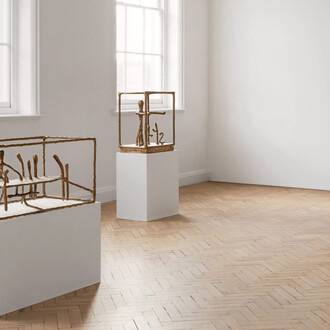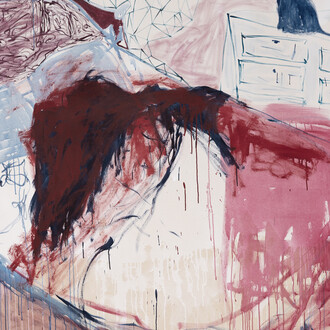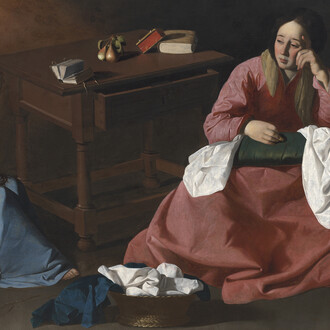Presenting Vas florum: resina botanica, a new exhibition of work by Marcin Rusak, the multidisciplinary artist and designer known for using flowers and other organic matter to explore themes related to decomposition, preservation and the passage of time. Featuring new pieces that continue Rusak’s explorations of coffee tables, and vases as functional contemporary artworks, the exhibition is a tribute to the evocative power of plants to encapsulate memories of people and places.
Vas florum: resina botanica evokes Rusak’s focus on the colours, patterns and shapes found in the natural world, whether in the sleek surface of a stone in a mountain river, the abundant varieties of floral species, or the entanglements of roots and branches that captivate him in his beloved Polish forests. The artist sublimates his impressions of these forms and textures into his works, translating their qualities into the porosity of sanded resin, or the coolness of patinated cast bronze.
Central to the presentation are new editions of the Resina botanica tables whose irregular shapes were informed by natural boulders found in the riverbed of the Solinka River in the Bieszczady Mountains Natural Park in Southern Poland. Embraced in patinated cast bronze bases, their tabletops highlight unique floral compositions cast in dark green and rust-hued resin, alluding to whirlpools of water and the leaves, lichens and weeds flickering just beneath the surface of the lively mountain river.
New sculptural vessels from the Vas florum series, which embed flowers within resin structures will be shown for the first time. In the latest editions, Rusak’s focus is on the astonishing variety of species found in certain flowering plant families, from orchids and carnations to roses, tulips, asters, daisies and hydrangeas. The dense, baroque-like compositions offer a glimpse into the history and science behind flower cultivation, allowing viewers to study the beauty and significance of the selected species.
Rusak’s artistic process can be seen as that of an alchemist, playing with the materiality of things and turning natural forms into sculptural, functional objects that comment on the world around us. Raised in a family of flower growers in Poland, the artist has long been fascinated by plants and floral matter as sources of inspiration and decoration. Preserved in various states of decomposition, these natural elements evoke themes of ephemerality and memory, while exploring the relationship between nature and human intervention. By reclaiming, manipulating and enhancing plants and flowers, Rusak extends their lifecycle and gives them renewed purpose.
















